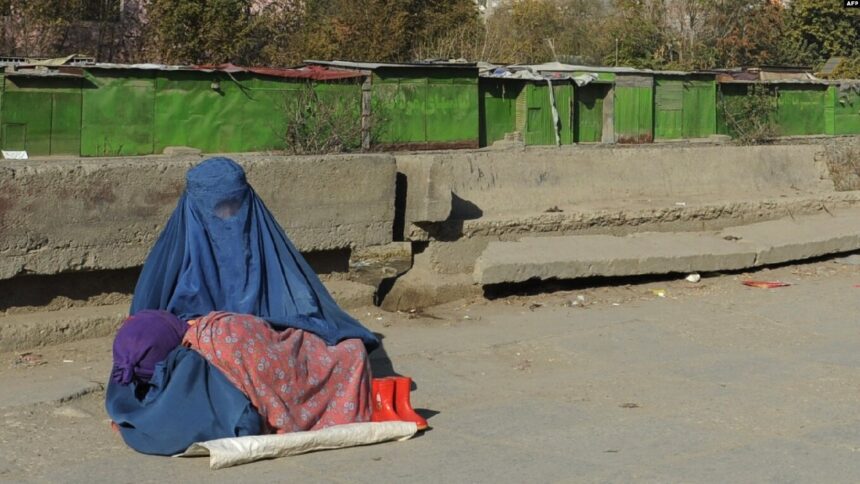RASC News Agency: Homeless women arrested by the Taliban for begging have recounted harrowing accounts of “brutal” sexual assaults, physical abuse, and exploitation in detention facilities. These women report being subjected to sexual violence, torture, and forced labor, while witnessing horrific acts such as the beating and deaths of children. On Friday, November 29, The Guardian published an investigative report based on interviews with women detained by the Taliban under charges of begging.
All interviewed women revealed that their turn to begging was driven by sheer desperation and the inability to find work to sustain themselves and their families. Zahra, a 32-year-old mother of three, described how her life spiraled after her husband, a former soldier in Afghanistan’s previous military, disappeared following the Taliban’s seizure of power in August 2021. Left with no support, she relocated to Kabul and began begging for food to feed her children. “I approached local government offices, explained I was a widow, and begged for assistance to feed my children,” Zahra recalled. “They told me they couldn’t help and suggested I sit near a bakery, hoping someone might offer charity.” She admitted she was unaware of the Taliban’s prohibition on begging until the day of her arrest.
Describing her ordeal, she recounted: “A Taliban vehicle stopped near the bakery, and they forcibly took my son, ordering me to get into their vehicle.” Zahra alleges that she was detained for three days and nights, initially made to cook, clean, and wash clothes for the male guards. When the Taliban sought to take her fingerprints and biometric details, she resisted and was beaten unconscious. Upon regaining consciousness, she discovered she had been sexually assaulted. “Since my release, I’ve contemplated ending my life many times,” Zahra admitted. “But my children keep me going. I think about who would feed them if I were gone.”
Another victim, Parwana, was arrested in October 2023 while begging on the streets of Kabul with her four-year-old daughter. She was held for 15 days at the Badam Bagh prison, where she suffered rape and torture. Parwana disclosed that during her detention, she and two other women were repeatedly assaulted, leaving her severely traumatized and battling depression. Parwana further alleged that the Taliban detained even children, including those working as street shoe-shiners. She recalled: “They berated us, questioning why we hadn’t married, beat us, and forced us to wash dishes and clean their facilities.”
Reports of rape and torture in Taliban detention centers extend beyond women. Some former prisoners, speaking to Zan Times, shared accounts of children being brutalized. One woman recalled witnessing two young children beaten to death during her detention. “No one dared speak out,” she said. “Those who did were beaten and called disgraceful. Watching those children die before my eyes is a trauma I will carry forever.” The Taliban’s “Law on the Collection of Beggars and Prevention of Begging” explicitly addresses the death of detainees. Article 25 states: “If a beggar dies in custody and has no relatives, or if the family refuses to claim the body, municipal authorities will oversee the burial.”
Since their return to power in August 2021, the Taliban have systematically stripped women of their rights, including the right to work, exacerbating poverty levels nationwide. This has disproportionately affected female-headed households, forcing many women into the streets to beg. On May 20, 2023, the Taliban’s Ministry of Justice announced the enforcement of the “Law on the Collection of Beggars and Prevention of Begging,” signed by the group’s supreme leader, Hibatullah Akhundzada. This law prohibits begging by individuals deemed physically capable or those with access to minimal sustenance.
Under this policy, the Taliban claim to have detained over 60,000 beggars across Afghanistan. However, unemployment and poverty have skyrocketed under their regime, leading to a sharp increase in the number of beggars, particularly in Kabul. According to United Nations estimates, nearly 24 million Afghanistanis now require humanitarian aid for survival.






